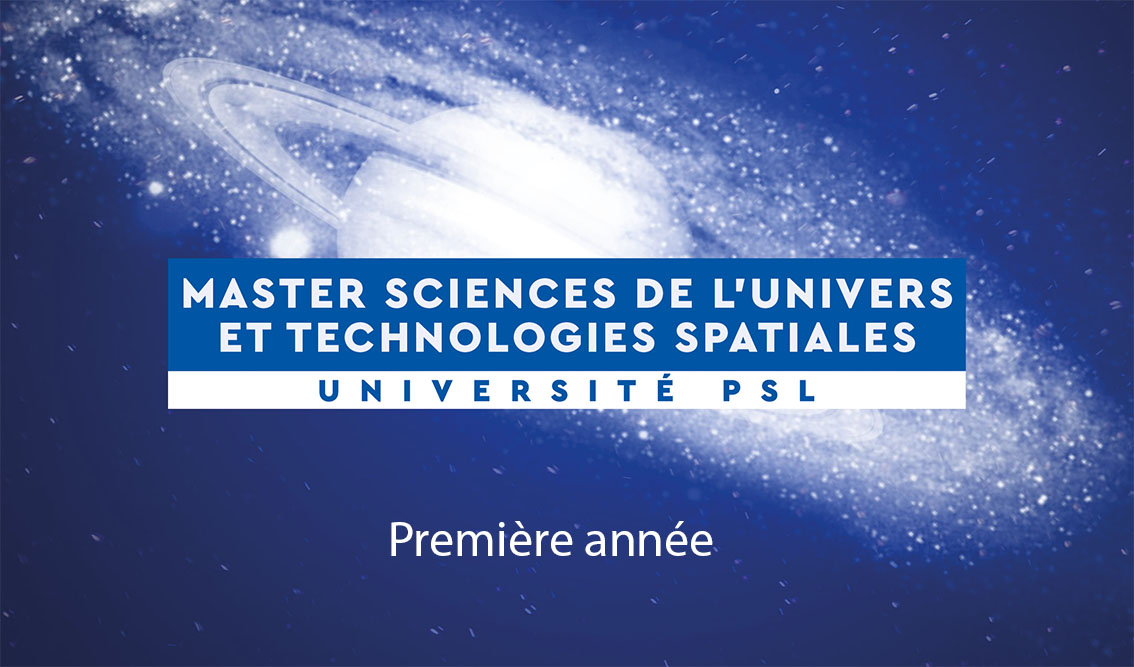The Graduate School benefits both from PSL’s rich academic environment and from long-standing synergies between research and training. With a strong emphasis on international collaboration, the program trains students through challenging research projects and prepares them for highly demanding scientific and technical careers, ensuring the best possible employability.
Admission
The first year of the Master is open to outstanding students who hold a Bachelor’s degree (equivalent to a Licence in the European LMD system) in physics, mathematics, or engineering — from Europe or abroad.
Applications for the 2026–2027 academic year are open from 15 January to 24 february 2026. Candidates may create an account and apply here (select: apply for M1).
Contact: master1.administration(at)observatoiredeparis.psl.eu
First Year Lectures (M1)
Courses in the first year of the Master in Space Science and Technology are held on the Paris and Meudon campuses of the Observatoire de Paris.
The full Master program extends over two years (four semesters), with approximately 300 hours of teaching per semester. The first year (M1) corresponds to Semester 1 (S1) and Semester 2 (S2).
First Semester (M1S1) ----> 30 ECTS
- Mandatory courses and other activities (9 ECTS):
| Computer Science |
3 ECTS |
| LIU (part time Internship: two half-days per week) |
6 ECTS |
Exceptionally, students may take one 3-ECTS course at another Université PSL institute, combined with a 3-ECTS LIU (one half-day per week).
- Elective courses (21 ECTS):
Each student must choose 2, 2.5, or 3 courses for a total of 12, 15, or 18 ECTS from the following list:
| Quantum Mechanics |
6 ECTS |
| Statistical Physics |
6 ECTS |
| Instrumentation: Physics and Instruments |
6 ECTS |
| Data Processing and Associated Methods |
(3+3) ECTS |
In addition, students must complete 3, 2 or 1 lecture(s) for a total of 9, 6, or 3 ECTS (depending on their first set of choices above) from:
| Hydrodynamics |
3 ECTS |
| General Astronomy |
3 ECTS |
| Mathematical Physics |
3 ECTS |
| Classical Gravitation |
3 ECTS |
Second semester (M1S2) -----> 30 ECTS
- Mandatory lectures and other activities (24 or 18 or 12 ECTS):
| Observational Techniques and Data Analysis |
3 ECTS |
| Research Internship (part-time between mid-January to mid-April; full-time between mid-April to mid-June) |
21 or 15 or 9 ECTS |
- Elective lectures (6 or 12 or 18 ECTS):
| Gravitation of Extended Bodies and Galactic Dynamics |
3 ECTS |
| Physics of the Interstellar Medium (Hydrodynamics and Radiation) |
3 ECTS |
| Metrology of Satellites |
3 ECTS |
| Analytical Mechanics (Lagrangian and Hamiltonian formalisms) |
3 ECTS |
| Relativity and Cosmology (Flat and Curved Spacetime Physics) |
3 ECTS |
| Stellar Physics (Hydrodynamics and Energy Transport) |
3 ECTS |
| (Astro)Particle Physics (Standard Model, High-Energy Physics) |
3 ECTS |
| Numerical Analysis |
3 ECTS |
| (Exo)Planetary Physics (Surface and Atmosphere) |
3 ECTS |
| Magnetohydrodynamics and Space Plasmas |
3 ECTS |
A detailed description of the lectures and lecturers is available here (version 13, December 2025)
Course Timetable 2025-2026
version 7 : 15 october 2025
First semester
version 7 : 15 october 2025
Second semester

